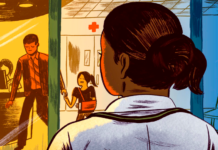How Do Clients Solicit Medication Changes With Psychiatrists?
Researchers examine psychiatrist-client interactions and find that clients are often left with few opportunities to make explicit requests to change their medication regimen.
Evolution or Revolution? Why Western Psychiatry Won’t Change by Incremental Steps
...but how realistic is it to expect that the biological skew of Western psychiatry can be sustainably changed one small step at a time?
Psychiatric Diagnosis Can Lead to Epistemic Injustice, Researchers Claim
A discussion of the role of epistemic injustice in the experiences of patients diagnosed with psychiatric disorders.
After the Black-Box: Majority of Children Starting SSRIs Still Receiving Too High of Dose
In 2004, the FDA added a black-box warning to SSRI antidepressants on the increased risk of suicide among children taking these drugs. A new study suggests that this warning has increased the proportion of children who begin an antidepressant on a low dose, but the majority are still receiving higher than recommended doses.
United Nations Rep Brings Attention to Human Rights Violations in Psychiatry
Dr. Dainius Pūras argues that the status quo in mental health treatment is no longer acceptable and demands political action to promote human rights.
The Interim Report on the Independent Review of the Mental Health Act: A Response
The report has succeeded in being supremely ambitious in its breadth, whilst remaining disappointingly cautious in its goals. The emphasis is on smaller changes in the immediate future, and kicking more progressive reform into the long grass. It alludes to but does not enshrine a rights-based approach.
“The Rise and Fall of the Blockbuster Antipsychotic Seroquel”
Martha Rosenberg highlights how the popular antipsychotic Seroquel is a perfect example of how direct-to-consumer advertising made billion dollar blockbuster drugs possible before side-effects...
Research Suggests that Forensic Psychological Examinations are Unreliable and Biased
Concerns have been raised about inconsistent and unreliable results, which may lead to injustices in sentencing or even wrongful convictions.
Study Identifies Psychiatric Patients at Greatest Risk of Coercion
In an effort to reduce coercion, researchers isolate associated factors including age, relationship status, location, and diagnosis.
Equal Legal Capacity or ‘Supported Decision-Making’?
At a recent conference on legal capacity, I was struck by the failure of another invited expert to adhere to the paradigm of supported decision-making as articulated by the CRPD Committee. We still need to work to ensure that this paradigm is well understood and appreciated, despite the progress made in national reforms.
Mental Health Nurses Do Not Routinely Assess for Effects of Antipsychotic Medications
Researchers believe that side-effect monitoring is critical because of the increase in the use of antipsychotics
My Response to the FDA’s ECT Rule Change
I lived through forced ECT from 2005-2006 at the Institute of Living in Hartford, Connecticut. My experience with ECT was the impetus for me to become involved in the antipsychiatry and Mad Pride movements, although I am not entirely opposed to voluntary mental health treatment. The following is the comment I submitted to the FDA on its proposal to down-classify the ECT shock device.
Benzodiazepine Prescriptions Increase with Overdose Deaths
A recent article in the American Journal of Public Health calls for policy level interventions to reduce the use of benzodiazepines, drugs commonly prescribed...
Rethinking Public Safety – The Case for 100% Voluntary
It is time to create an entirely voluntary psychiatric system. International conscience is clear. The singling out of people with psychosocial disabilities is not worthy of a free society. There are better, safer ways to address legitimate public needs.
Free ‘Commercial Speech’ Cases Threaten Pharmaceutical Regulation
Two recent court rulings argue that pharmaceutical companies have a first amendment right to market drugs “off-label” with a lack of scientific evidence, threatening...
The CHRUSP Call to Action, and Its Significance
Various instruments of the United Nations have commented on forced treatment, or involuntary confinement, or both (for details, see Burstow, 2015a), and a number of truly critical additions to international law have materialized. Arguably, the most significant of these is the Convention on the Rights of Persons with Disabilities. What makes it so significant? For one thing, it is because this landmark convention puts forward nothing less than a total ban on both involuntary treatment and the involuntary confinement of people who have broken no laws.
Genetic Tests Marketed to Psychiatrists Not Supported by Research
With the explosion of genetic testing and the emerging field of pharmacogenetics, patients can now take a DNA test and receive psychiatric drug recommendations customized to fit their genetic makeup. In an editorial for the latest issue of the Journal of Nervous and Mental Disease, Columbia University Psychiatrist Robert Klitzman warns that clinicians need to be aware of the limitations of these genetic tests being marketed to them.
The Ghost of Research Future
Two facts about Robert Califf are beyond question. He is an expert on clinical trials, who is already seen as a leading architect of the future of medical research. And as the New York Times put it, he has “deeper ties to the pharmaceutical industry than any FDA commissioner in recent memory”. A lot of senior figures in medicine support Califf in spite of his ties to Pharma. The guy is just so bright, and understands the nuts and bolts of drug research so well! Surely a person like this is more useful than some outsider who offers only a squeaky-clean resume, they argue.
We Need to Encourage People to Make Advance Directives
In this piece for STAT, Jennifer Adaeze Okwerekwu describes the value of psychiatric advance directives for those at risk of experiencing an emotional crisis.
"'It’s something that can...
Compulsory Treatment Laws in Germany’s Psychiatric Wards
The science magazine RUBIN provides an update on patients’ rights to refuse treatment in Germany's psychiatric wards. “In psychiatric wards in Germany, patients used to be medicated indiscriminately against their will if doctors considered it necessary. It was only after a Federal Constitution Court ruling a few years ago that patient autonomy has been strengthened.”
Forced Treatment Ineffective: Advocacy Essential
Most Americans would agree that we have problem with mental health in this country, but what many do not know when they consider that people who are in distress are not getting the help they need is that hospitals in this country are not giving people a choice when they are in the most need. This is based on laws that currently exist in 45 US States, which allow individuals to be petitioned into an inpatient psychiatric unit against their will if they are deemed to be a “danger to themselves or others.” I have worked for 3.5 years as a Peer Support Specialist within my local public mental health system, where I see this happen to the individuals I serve, on a regular basis. I myself have been forced.
“How Too Much Medicine Can Kill You”
In an op-ed for the Guardian, cardiologist Aseem Malhotra writes: “Corporate greed and systematic political failure have brought healthcare to its knees. There are too many misinformed doctors and misinformed patients. It’s time for greater transparency and stronger accountability, so that doctors and nurses can provide the best quality care for the most important person in the consultation room – the patient.”
Few Seniors Have Advance Directives, Yet Doctors Don’t Like It When They Do
In MinnPost, Susan Perry discusses a JAMA Internal Medicine study that found that, within 48 hours of being hospitalized, almost half of adults aged...
Leah Harris and Tim Murphy Talk “Mental Illness and the Law”
Today on Radio Times, U.S. Representative Tim Murphy (R-PA), Mark Salzer, professor and chair of the Department of Rehabilitation Sciences at Temple University, and Leah...
“Where Police Violence Encounters Mental Illness”
In The Opinion Pages of the New York Times, Matthew Epperson discusses the devastating results of police acting as the primary responders to mental health crises. “If we are to prevent future tragedies, then we should be ready to invest in a more responsive mental-health system and relieve the police of the burden of being the primary, and often sole, responders.”



















